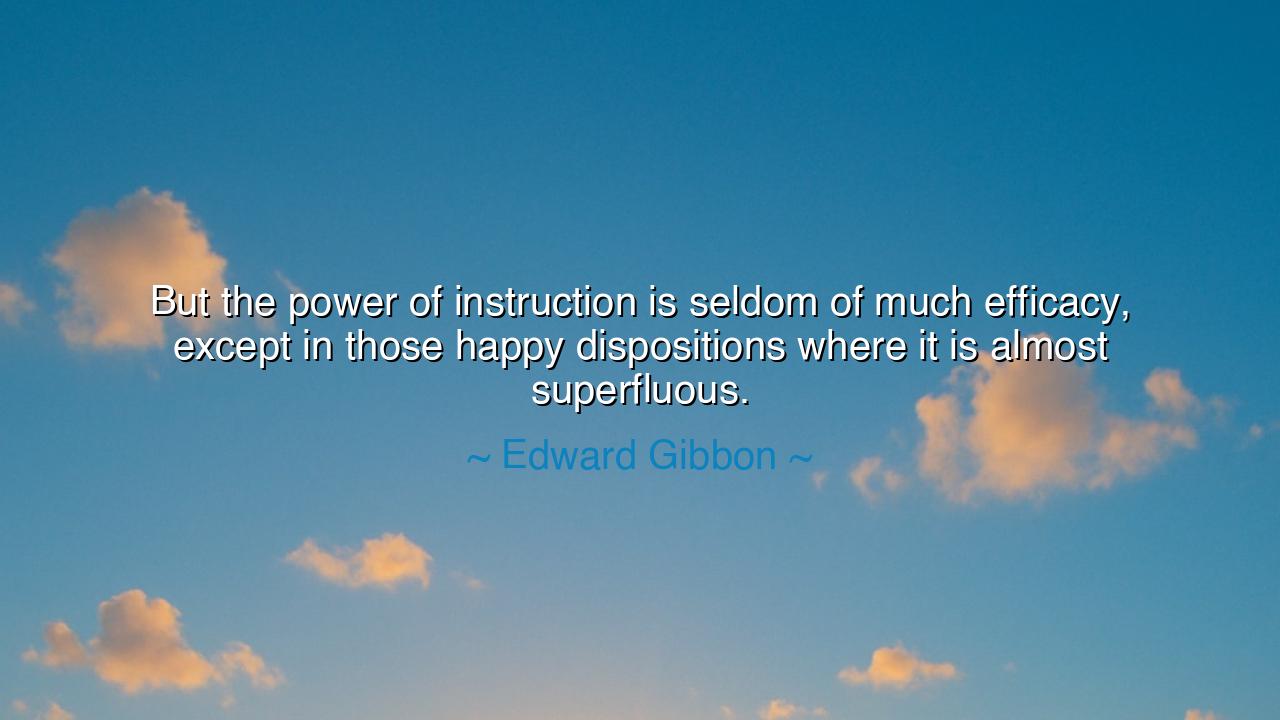
But the power of instruction is seldom of much efficacy, except
But the power of instruction is seldom of much efficacy, except in those happy dispositions where it is almost superfluous.






“But the power of instruction is seldom of much efficacy, except in those happy dispositions where it is almost superfluous.” These words by Edward Gibbon, the renowned historian, delve into the essence of learning and teaching. The power of instruction, though essential in many cases, is most effective in those whose hearts and minds are already inclined toward wisdom. Gibbon reflects a timeless truth: that instruction is most fruitful not when it is imposed, but when it meets fertile soil — the happy dispositions of those who are already naturally inclined to seek and embrace knowledge.
The ancient Greeks held similar views on the nature of learning. Socrates, the great philosopher, believed that true knowledge could not be simply given to a person, but must be drawn out from within. He often spoke of the soul as a vessel of truth, and his method — the Socratic method — was not to lecture but to ask questions, leading his students to recognize what they already knew within themselves. Socrates understood that instruction was most powerful not when it was imposed externally, but when it resonated with a mind already eager for wisdom. In this way, the very act of learning becomes a process of self-discovery, a recognition of truths that were always there.
Consider the story of Leonardo da Vinci, a man whose natural genius made much of his learning almost superfluous. His curiosity and his inherent disposition toward wisdom were so profound that much of his instruction seemed to be a mere formality. Da Vinci taught himself anatomy, engineering, and art by observing the world around him, seeing truths where others saw only chaos. His mind was so attuned to the beauty and complexity of the world that formal education could not contain him. Instruction was but the catalyst for an already fertile mind. His happy disposition toward discovery made learning an instinct, rather than a necessity.
Similarly, the story of Aristotle’s tutelage of Alexander the Great reveals the symbiotic relationship between a great teacher and a student with an eager, happy disposition. Alexander, despite his royal birth and privileges, was deeply passionate about learning and sought to absorb all of Aristotle’s teachings on philosophy, science, and leadership. While Aristotle was undoubtedly a brilliant instructor, it was Alexander’s innate thirst for knowledge and wisdom that made the lessons so impactful. Alexander did not simply receive instruction; he lived it, shaped by it, and ultimately used it to forge one of the most powerful empires the world has ever known.
Gibbon’s observation also resonates with the Stoics, who believed that wisdom and virtue were cultivated through personal effort and discipline, rather than external instruction. Epictetus, the Stoic philosopher, taught that instruction could show the path, but the true power came when the individual had the disposition to walk it. Without an internal desire to learn and grow, instruction remains fruitless. Gibbon echoes this idea, recognizing that instruction, when it meets resistance or indifference, fails to awaken the deeper capacities of the soul.
Thus, Gibbon teaches us a crucial lesson: the power of instruction lies not in the force with which it is delivered, but in the readiness of the heart to receive it. The most profound teachings are those that reach a mind already prepared, a soul already searching for truth. Wisdom does not spring from the mouth of the teacher alone, but from the inner disposition of the student, who must be willing to cultivate it within themselves.
In the end, let us remember that wisdom is a journey, one that requires a disposition that welcomes instruction, yet does not depend solely upon it. Like Socrates, we must recognize that true teaching is not about filling the mind with facts, but about awakening the dormant wisdom that lies within us all. Would you like to explore how this idea of disposition and teaching plays out in the lives of other great thinkers, like Confucius or Rumi?






TMTra My
This quote raises a philosophical concern about the role of innate character versus external guidance. If instruction only reaches those already predisposed to benefit from it, what does this mean for social inequality in access to knowledge? Does it imply that talent or inclination is more important than effort in learning? I’m curious about what this suggests for designing educational systems that aim to foster wisdom broadly, rather than only cultivating those already naturally inclined.
MVVo Nguyen Minh Vuong
Gibbon seems to highlight an uncomfortable truth about human nature and learning: not everyone is receptive to instruction. But I question whether this perspective underestimates the transformative potential of patience and persistence in teaching. Are there methods to make instruction more effective even for those who don’t naturally possess this advantageous disposition? It also makes me reflect on my own experiences—how often have I benefited more from self-motivation than from formal instruction?
THThu Hang
I find this observation both intriguing and a bit unsettling. It implies that instruction might be almost useless unless the student already has a favorable temperament. Does this mean that many educational efforts are fundamentally limited? Could it also suggest that cultivating the right disposition—curiosity, openness, and engagement—might be even more critical than the quality of teaching? I wonder how educators could practically identify and encourage these 'happy dispositions' in learners.
HLnguyen ha lan
This quote makes me think about the limitations of teaching and formal instruction. Is it suggesting that no matter how excellent a teacher is, the impact depends more on the learner’s natural disposition than on the instruction itself? If that’s the case, how can education systems adapt to nurture those who aren’t naturally inclined toward learning? It raises a bigger question about whether wisdom and understanding are innate qualities rather than skills that can be cultivated.